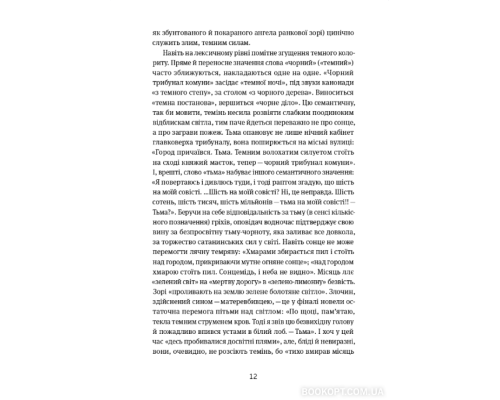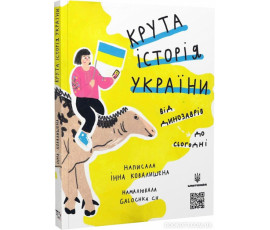Коли говорять гармати...Антологія української воєнної прози ХХ століття




















War is always a struggle - for yourself and with yourself. These are mental struggles and a beastly desire to survive no matter what. But even under such conditions, people try to preserve spirituality and culture. An example of this is the texts of the anthology "When the Gamata Speak", created during and after the difficult times of the liberation struggle.
The anthology included texts on pre-war topics by H. Kosinka, L. Pervomaiskyi, V. Pidmohylnyi, I. Senchenko, O. Slisarenko, H. Tyutyunnyk, M. Khvylovy, Yu. Yanovskyi. They highlight the atmosphere of the civil fratricidal war, the Red Terror, the invasion of Hitler's Nazis and the consequences of the fascist policy for the whole of Europe, as well as the wandering of the children of the war, torn from their roots and their homeland.
About the compiler:
Vira Ageyeva is a literary critic, critic, professor at the Kyiv-Mohyla Academy National University. Shevchenko Prize laureate. Author of the books "Oleksa Slisarenko" (1991), "Ukrainian Impressionist Prose" (1994), "Poet of the Turn of the Century: The Creativity of Lesia Ukrainka in a Postmodern Interpretation" (1999, 2000), "Women's Space: Feminist Discourse of Ukrainian Modernism" (2003, 2008 ), "Poetics of paradox: the intellectual prose of Viktor Petrov-Domontovych" (2006), "Apology of modernity: outline of the 20th century" (2011), "The art of balance: Maksym Rylskyi against the background of the era" (2012), "Roads and middle baptism" (2016 ), "The pattern on the stone. Mykola Bazhan: biography of a (non-)Soviet poet" (2018), "Behind the scenes of the empire: essays on Ukrainian-Russian cultural relations" (2021)
Quotes from the book
"Ukraine is doomed by its geography to military challenges, here one cannot remain without weapons and forget that the home should be a fortress. The frontier of Europe, the crossroads of interests, bloody lands, the empire from which we have been fighting back for several centuries. Kyiv survived the invasions of Polovtsians and Mongols, Russians and Hitlerites, but did not lose its state power and importance. Both world wars passed through our country like a fiery tornado, and this experience was reflected in national literature throughout the 20th century. It was in Ukrainian military prose that it was possible to talk about the deep traumas caused, to try to find answers to the questions about the causes of terror and the scale of losses. The answers are necessarily partial, but at least the topic is no longer taboo."
Vera Ageeva,
literary critic, critic, professor of the National University "Kyiv-Mohyla Academy".
"War. She walks on our land, on our field. How hard it is to think about it. However, our path was never lined with flowers. Well, let's hope that we will be able to hold out in this battle as well. This is my Motherland. I love her so much. To surrender her to the enemy is to lie alive in a coffin, it is to tear yourself away from your soil, from your youth, from your father and mother, from this sun, because there is no better sun than the one that peered into our cradle and caused the first hot streams sweat from the first attempts at labor. We will fight the fascists not to the death, but to the death, we will make our land a hell for them..."
Ivan Senchenko "September 1941 was ending"





